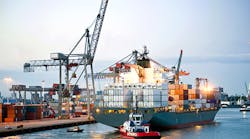Last October, when I wrote that Washington and Wall Street had staged a merger I was mainly stating the outrage that decent citizens and organizations felt on realizing we are on the hook for poor decisions and failures of irresponsible and disinterested officials. It’s still outrageous, but now the problem is not merely the injustice of this situation. It’s the incompetence.
You can try to understand what’s happening in normal business terms. The merger is complete and the new management team has set up their own operating group. They’re were just getting around to identifying the strengths and weaknesses of their acquisition — study groups, flow charts, lots of memos, etc. Then, new priorities took over. Budgets needed to be revised. A new marketing plan had to be developed in order to explain what the merger means, and why it will “strengthen” the organization.
Meanwhile, the executives, managers, and employees of the acquired company are still around, looking for a place in the revamped organization, which still hasn’t been outlined because the new management team is trying to deal with their own “crisis.” In their offices and cubicles, the displaced look for ways to get something done, but they can’t figure out the new budgeting rules, or anything else that’s changed. The new leadership is trying to downplay concerns, and the brain trust is huddling with its backers to come up with a program that they can “sell” to the market.
Anyone who reads the business section can identify this situation: the merger happened because one side got scared and the other side got greedy. The “deal” became the goal, not the organization that it aimed to create.
The merger never should have happened, but the parties pushing for it believed they were clever enough to make it work, even without a strategy.
So here we are. The world’s largest economy is locked down, and values are declining, because no one in a position to act has a clear view of how to address the crisis.
But, it’s worse even than that. In the vacuum created by this lack of foresight, government officials indicate they plan to transform the ways that real businesses operate. They’re incomprehensible accounting regulations make it impossible for large banks to lend capital. As a result, other banks have no flexibility, and no one can access or arrange the financing they need for essential things like payroll, purchases, or payments of any kind. No one dares to take a risk, so there is no growth.
Next to come will be the Employee Free Choice Act, the well-known “card check” bill. This will redefine “fairness” in management-labor relations, on the risible premise that workers are being prevented from asserting their will to organize. So, the right to make the decision will be taken from them. The cost of labor will rise without adding value to the finished product, reducing the operators’ incentives to grow the business.
Soon we may be presented with a grand plan to redefine industrial technology not as a means to growth but as burden to society . The aim is to tax carbon emissions in order to achieve unsubstantiated levels of atmospheric purity. The notion that this can be done without impacting businesses, workers, and consumers — to say nothing of tax revenues — shows how far our new management team is from understanding the difference between their own ideals and the real world they’re running.
Time to wake up. My business analogy is losing its relevance because “business,” as we’ve known it, is fading from view. Market rules have been suspended, and values are being suppressed in order to establish some new “reality.” Employers are intimidated into compliance with unions’ demands. Productivity will be discouraged in favor of responsibility. The result will be the opposite of “progress.”
It ought to be obvious that all of our economic problems result from a lack of growth, and that growth won’t be encouraged by policies of “restraint.” For now though, we’re all part of the same big, dysfunctional, unprofitable organization.










